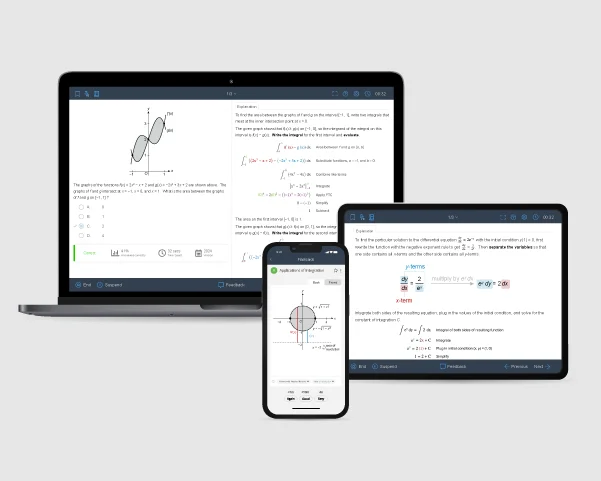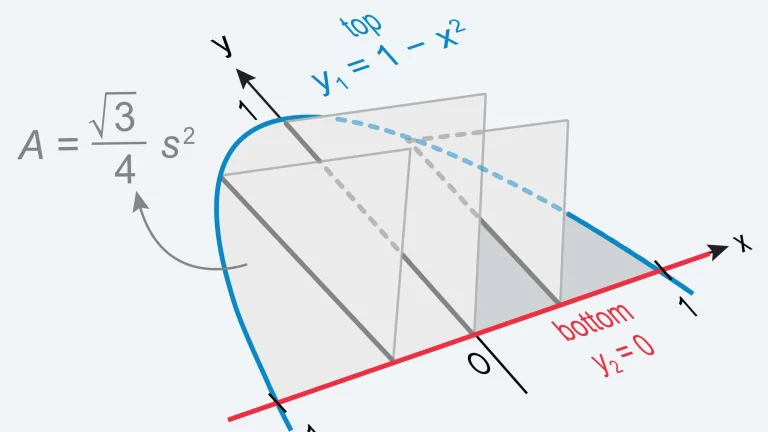The AP® Calculus AB exam has seen a notable improvement in student performance in 2024. Approximately 64.4% of students achieved a score of 3 or higher, marking a significant increase from the 58% in 2023. This places it among the higher-performing AP courses for the year. With the right preparation and resources, the exam becomes much more manageable. Whether you're aiming for a 3 to earn college credit or striving for a 5 to enhance your college applications, UWorld offers comprehensive support. This AP Calculus AB study plan provides essential knowledge and preparation tips to help you excel and achieve your target score.
How To Prepare Effectively for the AP Calculus AB Exam
In this guide, we will assist you at every stage of the process. From the moment you sign up for an AP Calculus AB course to exam day, follow these steps to prepare and improve your chances of achieving the score you want.
How to Prepare for an AP Calculus AB Class
Whether you’re starting the AP Calculus AB class or already enrolled, there are several steps you can take to ensure success:
- Get a Head Start: Use the summer before school starts to review key algebra and pre-calculus concepts. Focus on functions, limits, trigonometry, and basic geometry formulas.
- Review the AP Calculus AB Course and Exam Description: Familiarize yourself with the syllabus and key concepts that will be covered in both the class and the exam.
- Talk to Your Teacher: Discuss expectations with your AP teacher, and seek advice on what areas of the course may require extra attention.
- Find the Best Learning Style: Experiment with different resources like Khan Academy, Paul's Online Math Notes, or UWorld’s AP Calc AB study guide in print and e-book format to find out what works best for your learning.
Key Strategies to Excel in AP Calculus AB
To excel in AP Calculus, mastering core concepts is crucial. Focus on derivatives and integrals, as most problems will stem from these areas.
- Practice Regularly: Use UWorld's AP Calculus AB question bank to solidify your understanding of key concepts. Work on derivatives, integrals, and word problems regularly.
- Use Flashcards: Make flashcards for fundamental derivative and integral rules, and review them regularly.
- Practice FRQs: College Board’s past FRQs are invaluable for understanding the format and common types of questions. Focus on related rates, approximating derivatives, and integrals.
- Brush Up on Early Topics: At the end of the year, review early topics to avoid forgetting them.
How to Score a Top Mark (4 or 5) on the AP Calculus AB Exam
Aiming for a high score? Here’s how to boost your performance: You don’t need to ace the AP Calculus AB exam to score a 5—just under two-thirds of the total points is enough. Mistakes are normal, especially on a tough exam like this.
- Understand the Scoring Criteria: Know that scoring a 5 doesn’t require perfection. A solid understanding of key topics, like derivatives, integrals, and related rates, can put you in a good position.
- Study Consistently: Start at least 3–6 months in advance. Focus on practicing with MCQs and FRQs, and track your progress.
- Work on Time Management: The AP exam is timed, so practice under exam conditions to develop your pacing skills. Work on questions you tend to get stuck on to improve your speed and accuracy.
"According to the College Board, 21.4% of 278,657 test-takers scored a 5 on the 2024 AP Calculus AB exam."
Commonly Challenging Units and Topics
In AP Calculus AB, certain units stand out as challenging. For 2024-2025, focus on:
- Unit 5: Master separation of variables and solving differential equations. Strengthen algebra, exponent rules, and logarithmic concepts.
- Unit 8: Understand volume formulas (disk and washer methods, cross-sectional volume). Know area formulas for semicircles and other shapes.
- Unit 4: Related rates problems require organization and careful interpretation of increasing/decreasing quantities.
Avoid common errors, especially in u-substitution (Unit 6). Practice consistently, review mistakes, and cross-check your work by differentiating your results. Leverage UWorld's question bank for targeted preparation.
How to Self-Study for the AP Calculus AB exam: Watch, Read, Practice
Blending different learning strategies is the key to mastering AP Calculus AB. By incorporating videos, reading materials, and practice problems into your routine, you’ll develop a well-rounded understanding of the material. Our Watch, Read, Practice methodology supports every learning style, helping you study effectively and stress less.
- Watch:
Start with our course videos for concise, engaging lessons that simplify even the toughest concepts. These videos are tailored to help you grasp the material quickly and effectively. You can also supplement with Khan Academy for basics or Professor Leonard on YouTube for in-depth lecture classes.
- Read:
Use our topic-by-topic study guide, featuring colorful visuals and clear explanations designed specifically for the AP Calculus AB exam. If you want additional options, Paul’s Online Math Notes is a solid free resource.
- Practice:
Reinforce your knowledge with hands-on practice using UWorld’s AP Calculus AB QBank. It includes hundreds of exam-style questions, detailed explanations, and performance tracking to help you identify and focus on weak areas.
With this streamlined strategy and our comprehensive course resources, you’ll be well-prepared to master AP Calculus AB and achieve a top score!

AP Calculus AB Study Plan
It's the spring semester and it's crunch time! No matter how much time you have left, we've got some handy tips to help you get ready for the AP Calculus AB exam. Here’s a straightforward study plan you can follow:
- Begin in February to ensure ample time to cover all units.
- Unit 1 – Limits: Spend 1 week.
- Units 2-5 – Derivatives: Allocate 2 weeks.
- Units 6-8 – Integrals: Dedicate 2 weeks.
- Refresh your understanding using your textbook or UWorld’s prep book.
- Set aside two to three short sessions each week to review MCQ-style practice questions.
- Consistently revisit challenging concepts.
- Start timing your MCQs to match exam conditions: aim for 2 minutes per non-calculator question and 3 minutes per calculator question.
- Review past FRQs from the College Board to familiarize yourself with potential essay questions.
- Outline and practice writing responses at least twice a month.
- Time yourself to adapt to the exam pace.
- Create and review flashcards daily for key formulas and rules.
- Regularly schedule breaks to stay refreshed—plan a day off each week or take an afternoon off when necessary.
- Start with a general review of course topics, unit-by-unit at a quicker pace.
- Utilize resources such as textbooks, class notes, and course materials for concept refreshers.
- Prioritize completing textbook practice problems and using the UWorld QBank two to three times per week for 20-30 minutes per study session.
- With UWorld: To save time, focus on explanations for missed questions reviewing the concepts that need the most improvement.
- Limits and Derivatives (Units 1–5):
Allocate 2 weeks, approximately one unit every two days. - Integrals (Units 6–8):
Allocate 1 week, approximately one unit every two days.
- Use any remaining time to review concepts from each unit which you missed previously to reinforce learning.
AP Calculus AB Exam Review/Study Materials
Here’s a curated collection of study materials to streamline your AP Calculus AB exam prep. While many of these resources are mentioned throughout this guide, we've compiled them here for easy access.
Question Banks and Practice Problems
- UWorld AP Calculus AB Prep Course: Advanced AP-level MCQs with in-depth explanations that help you learn from mistakes.
- College Board FRQs: FRQs from past exams that provide excellent practice for those sections.
Video Content
- UWorld Course Videos: Concise, engaging lessons tailored to simplify complex concepts and make them easy to grasp.
- Khan Academy: Introductory-level videos to learn concepts with basic skill-building questions.
- Professor Leonard: In-depth college lecture videos that break down calculus concepts but may be lengthy for some learners.
Now that you know how to study for AP Calculus AB, it's time to begin your exam prep. Good luck, and happy studying!
References
- Past AP Calculus AB Score Distributions. (2024). apcentral.collegeboard.org. Retrieved December 11, 2024, from https://apstudents.collegeboard.org/about-ap-scores/score-distributions/ap-calculus-ab
- 2024 AP® Calculus AB Scoring Guidelines. (2024). apcentral.collegeboard.org. Retrieved December 11, 2024, from https://apcentral.collegeboard.org/media/pdf/ap24-sg-calculus-ab.pdf
AP Calculus AB Related Topics
How to Answer AP Calculus AB FRQs
Master AP Calculus AB FRQs with our step-by-step guide. Learn tips and strategies to tackle free-response questions and maximize your score on the exam.
How to Approach AP Calculus AB MCQs
Master the best tactics for AP Calculus AB MCQs. Our tips help you understand question types and solve multiple-choice questions quickly and efficiently.
Access the essential AP Calculus AB Formula Sheet — easily find all the critical formulas you need in one convenient place to enhance your preparation.
How to Self Study for AP Calculus AB
Want to ace AP Calculus AB on your own? Follow this expert self-study guide with tips, tricks, and tools to prepare effectively for the exam.
Best AP Calculus AB Study Guide Comparison
Compare the best AP Calculus AB study guides! See how Kaplan, Barron's, and Princeton Review stack up against UWorld for comprehensive exam prep.
Best AP Calculus AB Prep Course Comparison
Searching for top AP Calculus AB prep courses? Read this review to compare the best courses and choose the perfect one for your success.



